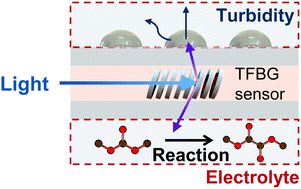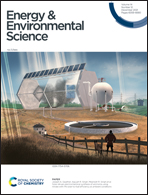Monitoring battery electrolyte chemistry via in-operando tilted fiber Bragg grating sensors†
Abstract
Operando tracking the chemical dynamics/states of a battery and its components is critical to their second life for boosting their sustainability. Herein, we demonstrate the feasibility and diversity of the tilted fiber Bragg grating (TFBG) optical fiber sensors to operando access the chemistry and states of electrolytes. We show how a single TFBG sensor can simultaneously measure the temperature and refractive index evolution inside the batteries, which pertains to the chemical evolution of the electrolyte. We also, for the first time, monitor the turbidity of electrolytes via the particulate-induced optical scattering and absorption. These unravelled electrolyte characteristics by TFBG help determine the electrochemical reaction pathways, being strongly correlated to the capacity loss. This type of sensing offers intriguing opportunities to building a “lab-on-fiber” platform for deeper chemistry and practical applications, provided we can delicately converge electrochemistry, photonics, and data science.



 Please wait while we load your content...
Please wait while we load your content...